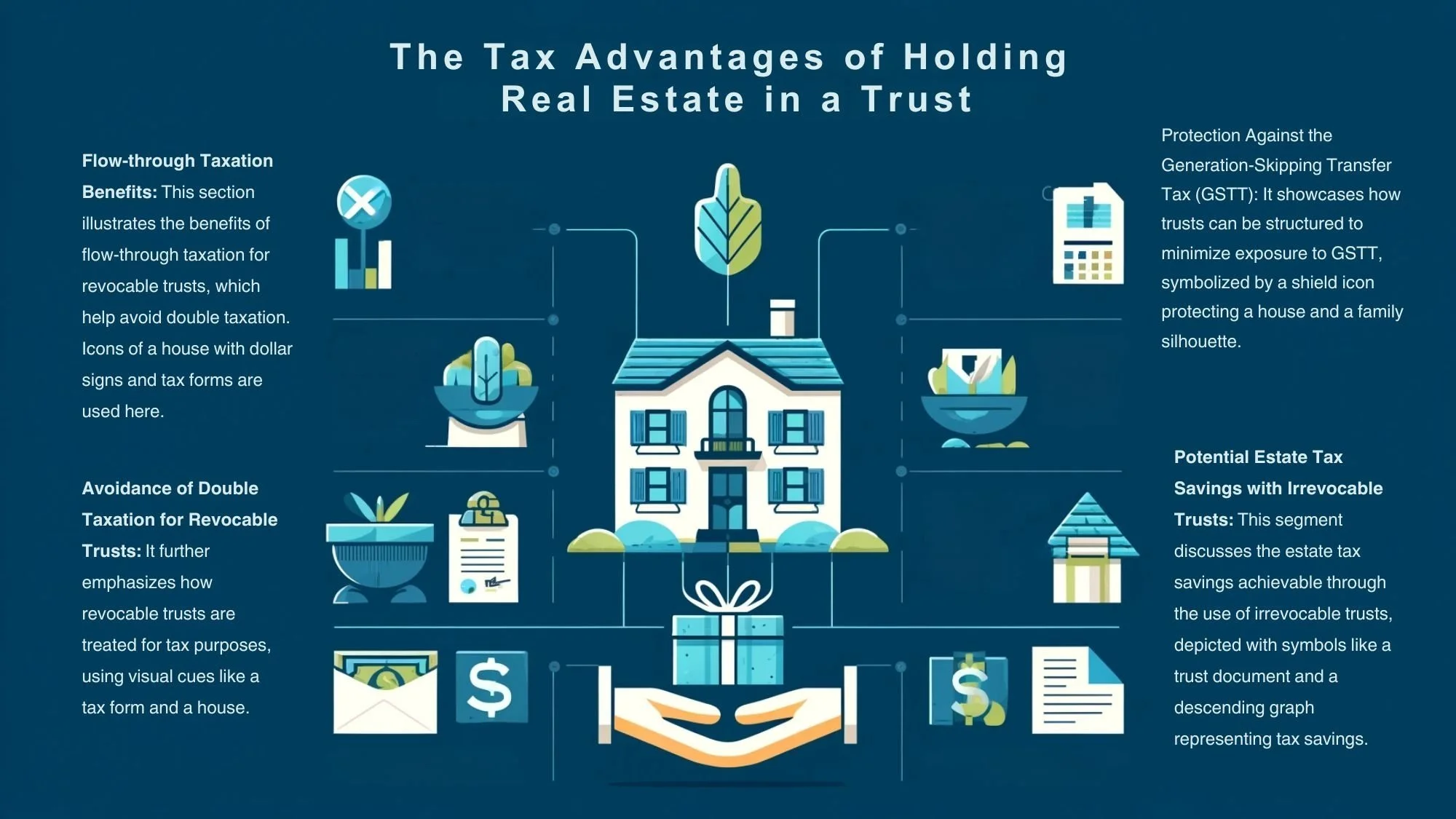The Tax Advantages of Holding Real Estate in a Trust
When considering estate planning and asset protection, using trusts to hold real estate can offer significant tax advantages. This blog post delves into the specific benefits of both revocable and irrevocable trusts, particularly focusing on their impact on taxation. Here’s a breakdown of how trusts can be advantageous from a tax perspective.
1. Flow-through Taxation Benefits for Revocable Trusts
Revocable trusts are a popular choice for estate planning due to their flexibility and ease of control. One key benefit of placing your real estate in a revocable trust is the advantage of flow-through taxation. This means that any income generated by the trust, such as rental income from real estate, is treated for tax purposes as if it were earned directly by the trust's grantor. This flow-through taxation structure helps avoid the complication of double taxation — where both the trust and the beneficiaries would be taxed.
2. Avoiding Double Taxation with Revocable Trusts
Expanding on the flow-through nature of revocable trusts, it's essential to understand that these trusts do not stand as separate tax entities. Therefore, all items of income, deductions, and credits flow directly to the grantor's personal tax returns. This direct approach not only simplifies tax filing but also prevents the potential financial drain of double taxation, ensuring that taxes are only paid at the individual level and not at both the trust and individual levels.
3. Potential Estate Tax Savings with Irrevocable Trusts
Irrevocable trusts, while less flexible than their revocable counterparts, offer significant advantages when it comes to estate tax savings. By transferring real estate into an irrevocable trust, the property is legally removed from the grantor's estate. This means that upon the grantor’s death, the value of the property is not included in their estate for estate tax purposes. This can lead to substantial tax savings, especially for higher-value estates that would otherwise face hefty estate taxes. The use of a trust protects the assets from estate tax, preserving more of the estate’s value for the beneficiaries.
4. Protection Against the Generation-Skipping Transfer Tax (GSTT)
Another crucial advantage of using trusts, particularly irrevocable trusts, is their ability to minimize exposure to the Generation-Skipping Transfer Tax (GSTT). This tax is imposed on transfers to a "skip person" (typically a grandchild or any non-spouse who is more than 37.5 years younger than the donor). Trusts can be structured to shield beneficiaries from GSTT, ensuring that the assets can be passed down to successive generations without incurring excessive taxes that could deplete the estate's value.
Conclusion
The strategic use of trusts in managing real estate assets not only facilitates smoother estate planning but also provides significant tax advantages. Whether you choose a revocable trust for its flexibility and direct tax benefits or an irrevocable trust for its asset protection and estate tax savings, understanding these options is crucial. It is always recommended to consult with estate planning and tax professionals to tailor the trust structure to your specific needs and maximize the financial benefits for your heirs.
Don't miss your chance to explore the perfect property or get expert advice on your next real estate venture. Contact Louis DiGonzini today for a personalized consultation that aligns with your unique aspirations.
📞 Call Now: 949-922-8420
📧 Email: Ldigonzini@thedigonzinigroup.com
DRE #01502775
Take the first step towards making your real estate dreams a reality with Louis DiGonzini, your trusted advisor in the journey ahead. Reach out today!
Blog Disclaimer:
Please be advised that I am not a Certified Public Accountant (CPA), attorney, or lawmaker. The content provided on this blog, including all text, images, and other materials, is for informational purposes only and reflects my personal opinions formed through research.
The information shared on this blog should not be considered legal, financial, or professional advice. It is highly recommended that readers consult with a qualified professional, such as a CPA, attorney, or relevant expert, for specific advice tailored to their situation.
While I strive to provide accurate and up-to-date information, I cannot guarantee the completeness, reliability, or accuracy of the content presented on this blog. The use or reliance on any information contained on this site is strictly at your own risk.
Thank you for visiting and reading. Your understanding is appreciated.

